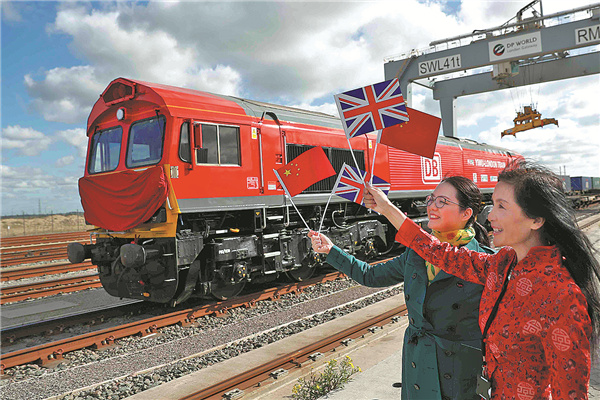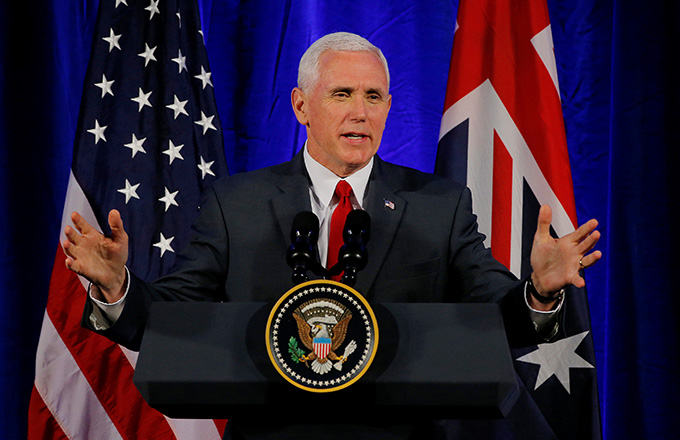UK further embraces Belt & Road Initiative
Well-wishers mark the departure of the first cargo train full of British exports being shipped directly to China, at the London Gateway terminal in Essex on Monday. Peter Nicholls / REUTERS

Britain hopes to provide services across a range of sectors to aid expansion of the Chinese project. Angus McNeice reports from London.
Editor's note: This is the fourth installment of China Daily's special series on the Belt and Road Initiative. [First installment: Russia;?Second installment: Uzbekistan; Third installment: Sudan]
Friday marks the one-month countdown to the Belt and Road Forum in Beijing in May.
This year, the United Kingdom became the westernmost point in the Belt and Road Initiative's sprawling land-transportation network when a freight train crossed the deserts and mountains of Eurasia on the 12,400 km journey from Yiwu, Zhejiang province, on China's eastern coast, to Barking Station in London.
The UK has been a strong advocate of President Xi Jinping's signature international development and infrastructure plan since 2013, when the Silk Road Economic Belt and the 21st Century Maritime Silk Road, known together as the Belt and Road Initiative, were proposed.
British companies have worked on dozens of Chinese development projects along the initiative's proposed routes. The UK's most visible endorsement of the plan came in 2015, when it joined the China-led Asia Infrastructure Investment Bank. In February, Chinese government sources told news outlets that China had invited British Prime Minister Theresa May to its major Belt and Road summit in Beijing in May.
In March, Liu Xiaoming, the ambassador to the UK, said China views Britain as "a country of global influence" and an important partner for the initiative.
James Sassoon, chairman of the China-Britain Business Council and a member of the British House of Lords, said this view, coupled with the UK's already active involvement, places the nation in prime position to expand its contribution to the initiative beyond the provision of legal and financial services.
"In the Belt and Road, we are beginning to see a glimpse of the future," Sassoon said.
"And the Belt and Road is still evolving. That is why the expertise of UK financial, legal and advisory services are so important at this early stage. However, we also see longer-term opportunities for UK-China collaboration in third countries across many other sectors, including manufacturing, logistics, agriculture, food processing, science and technology, education, healthcare and retail."
British companies active in Belt and Road nations include BP, Arup, Atkins and Mott Macdonald in the energy and infrastructure sectors, HSBC and Standard Chartered in banking and financial services, and KPMG, PWC and Pinsent Masons in professional and legal services.
Last year, Linklaters, a London-headquartered law firm, provided legal advice to a Chinese bank in a $1.95 billion deal for the Thar Block II mining and energy project in Pakistan. In March last year, UK law firm Herbert Smith Freehills was involved in the Silk Road Fund's acquisition of a stake in Novatek, a natural gas producer in Russia. Meanwhile, in October, the London Metal Exchange, the global center for industrial metals trading, agreed to invest in warehouse construction along the Belt and Road routes.
In late March, at the Boao Forum's annual conference in Hainan province, Li Ruogu, former chairman of the Export-Import Bank of China, said collaboration between the UK and China on the initiative and a new trade dialogue following Britain's exit from the European Union could deepen ties between the two nations.
Commercial considerations
Bilateral trade between China and the UK has surpassed 60 billion pounds ($74.5 billion) in each of the last two years, having increased more than two and a half times in 10 years. Recent reports show that the UK received almost 25 percent of China's entire inward stock of investment to the EU last year.
The initiative has augmented trade between the UK and China, with the creation of the Yiwu-London rail line and the launch of a representative office for the Chengdu International Railway Service in London.
The rail company operates the Chengdu-Euro Express Railway, one of the largest land trade routes by volume between Asia and Europe. Stephen Rinsler, director of the UK's Chartered Institute of Logistics and Transport, said if the rail link can prove its reliability it will provide a valuable alternative for exporters because rail is cheaper than air and faster than shipping.
Nathan Hayes, an economist at the Construction Intelligence Centre in London, said as markets along the routes develop and investment drives further growth, secondary opportunities for the UK will likely be found across multiple sectors. "UK businesses can leverage the improving business environments and better access to growing, liberalized markets along the Belt and Road routes to secure opportunities across sectors," he said.
Hayes argues that this secondary British involvement is likely to arrive as a trickle, not a wave. That's because many of the countries along the routes are emerging markets with potential risk factors, such as foreign-exchange volatility, recession and the "crowding-out" of private sector investment as a result of government activity.
"Operating risks are obviously much higher in such environments, and project management may be much more fraught," he said. "Such environments present the greatest risks to UK companies attempting to conduct business."
Sassoon, of the China-Britain Business Council, said an initial "leap of faith" will be required by participants in an initiative of the scope and scale of the Belt and Road. The region covers around two-thirds of the world's population, accounting for about one-third of global GDP.
"Something of this nature requires vision and dogged commitment to bring to life", he said. "The commercial opportunities are clear in the long term, and the value of individual projects in remote or underdeveloped areas can only be realized when they are part of a linked network."























